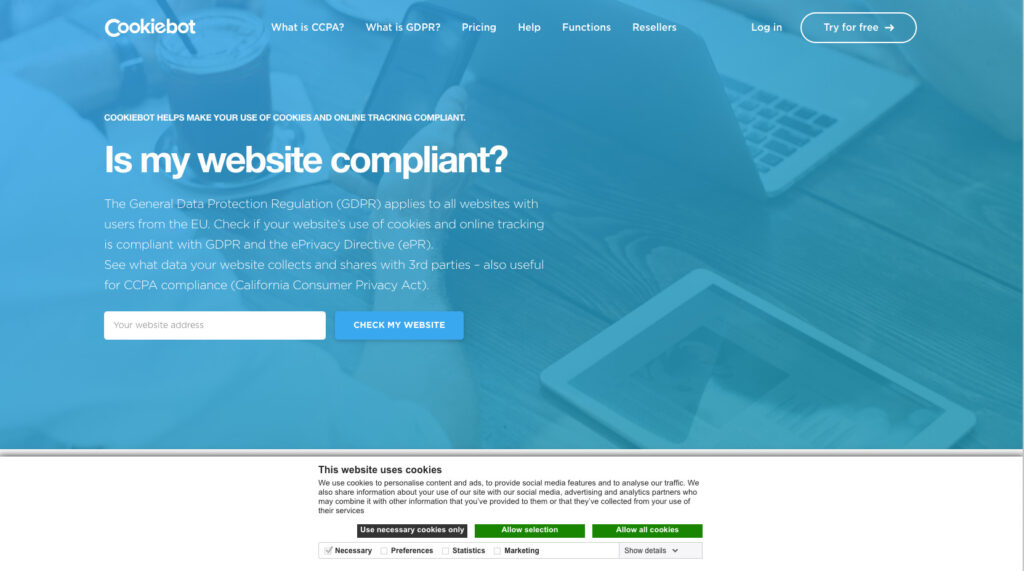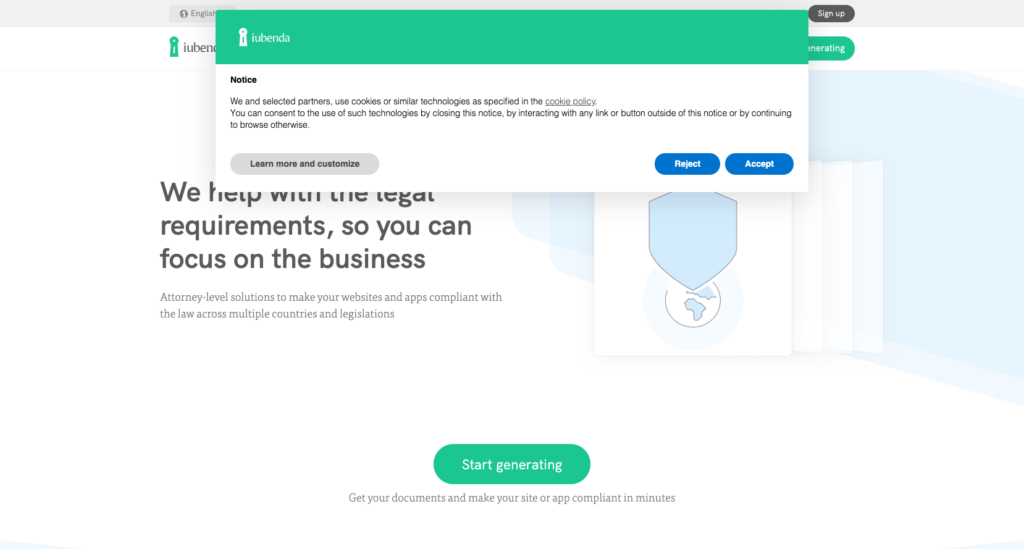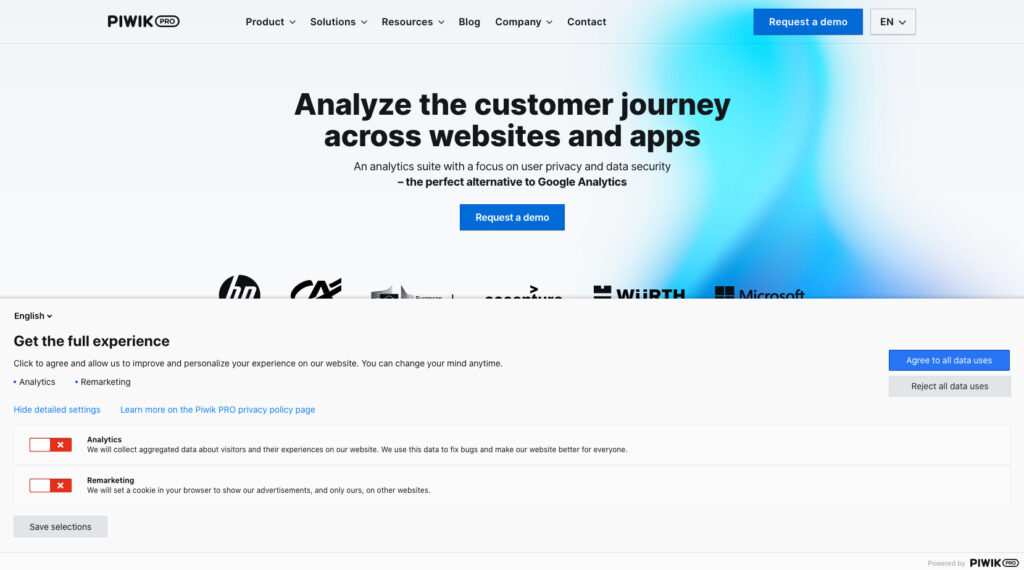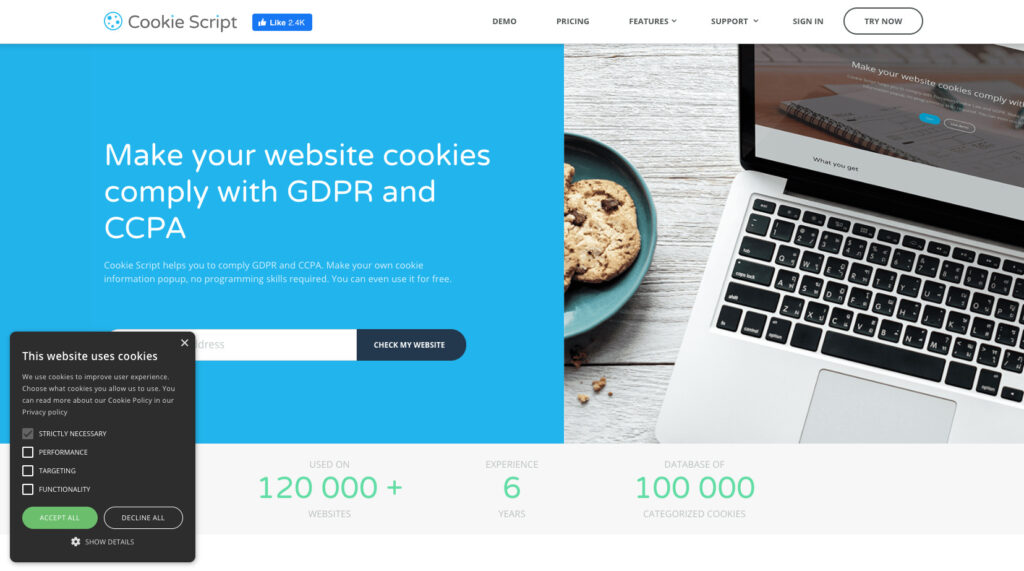10 Cookie Consent Management platforms
There are a lot of tools out there that will do the job for you. Most of them offer a free option for use on a single website.
Cookie consent management platforms have become an integral part of increasingly more websites the last two years. The European Union kickstarted this evolution back in 2018 with the introduction of the General Data Protection Regulation (GDPR). It was clear from the off that the EU was serious in protecting its citizen’s rights online. Although the GDPR specifies privacy protection both online and offline, the focal point has been on the collection of cookies. Many websites already featured some sort of cookie notification well before the GDPR was implemented. But these were often just plain banner at the top or the bottom of the screen where the visitor was simply informed about the collection of cookies. Often the only thing he could do was to push a button to acknowledge.
- Read more: What impact does GDPR have on Google Analytics
- Read more: Make your own cookie bar with jQuery
The EU set a world first back in 2018 but the fact that other countries are following suit proves that there is indeed concern that we are constantly followed on the internet. In January 2020, California introduced the California Consumer Privacy Act (CCPA). A month later, Brazil introduced the Lei Geral de Proteção de Dados (LGPD). Both are clearly derived from the EU’s GDPR. A detailed comparison goes beyond the scope of this blog post. But the recurring focus point is clear: as an individual, a website visitor has the right to remain anonymous if he chooses to. So concretely you have to offer him the possibility to refuse cookies when he arrives on your site. If he does agree to be followed, he has to give his consent in a very specific way.
At first the majority of website owners believed that the EU would aim for the usual suspects like Google, Amazon and Facebook (which was true). But since 2019 more and more small and medium businesses have been fined for not respecting cookie policies. It is clear that the EU is serious in implementing the GDPR.
How to comply with GDPR’s cookie policy?
As we already mentioned: the key is the user’s consent. So the visitor has to approve the use of cookies explicitly. On top of this you have to:
- give the visitor an overview of all the cookies you are collecting, who sets them, what they do and how long they remain valid.
- make a clear distinction between necessary cookies, analytical cookies, third-party cookies, marketing cookies. The classification is not always clear-cut (e.g.: is the Google Analytics cookie an analytical or a marketing cookie?). The bottom line is that you are only allowed to place strictly necessary cookies without the user’s consent.
- provide a detailed and comprehensible cookie policy, in the website’s language. So if you have a multilingual website, you have to provide this in every available language.
- give the user the possibility to opt out of cookies at any time, even when he gave his consent in the past.
That’s a whole bunch and if you are not really tech savvy you might wonder how to deal with this. Fortunately, there are a lot of cookie consent management platforms out there that will do the job for you. Most of them offer a free option for use on a single website.
1. Cookiebot
One of the most popular tools available, Cookiebot covers pretty much covers all the necessary topics. It offers an automated cookie scan and declaration, a cookie consent banner, a cookie control and JavaScript SDK and a global cookie repository. You can use it for free on a single website as long as the site has a maximum of a 100 subpages. The cheapest paid option is 9€ per month for a website up to 500 subpages.
2. TrustArc
Formerly known as TRUSTe, the San Francisco-based company has been around since 1997. It offers a wide range of privacy-related products and services. It also offers three cookie banner formulas: free, professional and advanced. The free option gives you a cookie banner, website scanning, basic user interface options, cookie preferences management, a tracker database, and support. Do note the free option is only for one language so if you have a multilingual website, you have to consider one of the paid options for which you have to request a quote.
3. Iubenda
Iubenda is an Italian company based in Milan. It offers several formulas either for one site/app or for multiple sites/apps. The free Basic option will offer you quite some options but again: only for one language. Paid formulas also offer options for broader Privacy Policies or Terms & Conditions.
4. CookiePro by OneTrust
You can choose from four plans: a free basic plan, a start plan for 10€/month, a standard plan for 25€/month and an enterprise plan for 40€/month. You can implement the free edition on one domain with up to a 100 pages for one language. One subdomain is also included.
5. Piwik PRO
Piwik PRO offers full-scale analytics and privacy solutions. They have branches in Wroclaw, New York, Köln and Rotterdam. If you want to go for a full-fledged analytics and consent solution, this might be your best pick. Do note there are no free formulas. You have to request a quote for a tailored solution.
6. Civik UK
Three formulas: a Community formula for free for one domain, a Pro formula for 39£/month per domain and a Multi Site formula for 199£/month per domain. The free option is not unlimited as far as the number of pages on your domain is concerned but it is again only for one language.
7. Cookie Script
You gan choose from four formulas here: Free, Lite, Standard and Plus. The Free option is not limited by any number of domains, contrary to the tools mentioned above in this list. The options are pretty limited on the other hand. It only scans 10 pages per domain and there is no automated monthly scan. The paid options are pretty cheap too. But only applicable from per 2, 5, 15, 50 or 200 domains at once.
8. Consent Manager
Consent Manager lets you choose from four options: a Basic free version, a Standard version for 50€/month, an Agency version for 200€/month or an Enterprise version for 695€/month. You can implement the Free version on 1 website or app and it allows you 10000 page views per month.
9. Osano
Here you can also pick from four options: a free Basic plan, a Business plan for 85.44€/month, a Business Plus plan for 170.90€/month (if paid annualy). A tailored Entreprise plan is on request. The Basic plan will give you 1 user for 1 domain with up 7500 monthly unique visitors.
10. Legal Monster
Three formulas to choose from: Cookie Free, Cookie Pro for 59$/month and Cookie Enterprise for 199$/month. The free option allows you 1 domain, country and language. Every 14 days, the toolscans up to 100 pages.






